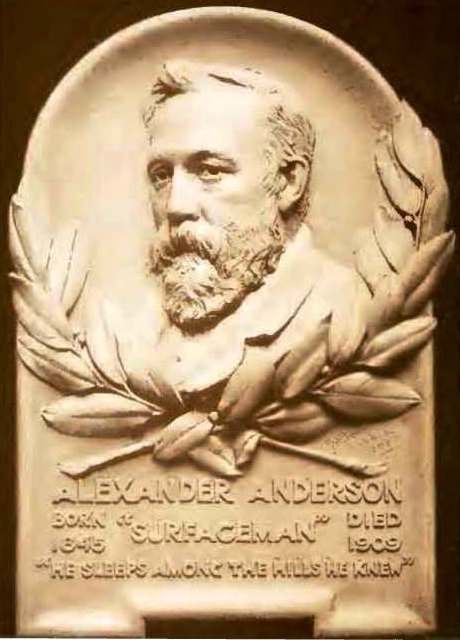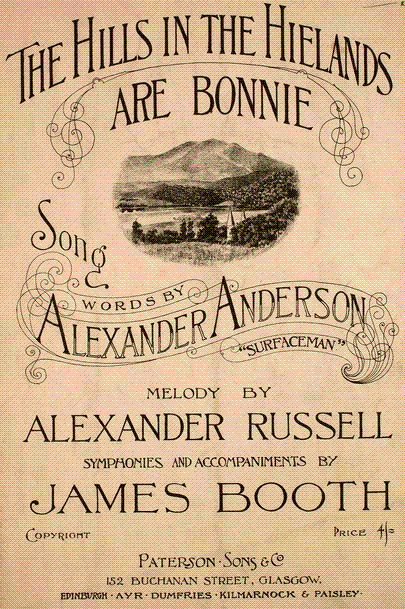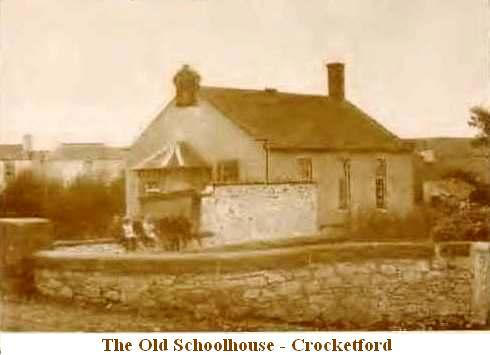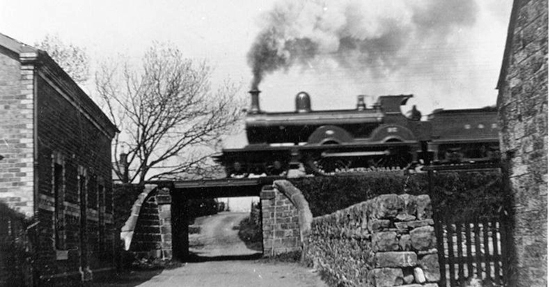|
ALEXANDER ANDERSON (1845-1909) – Railwayman, Librarian,
Poet, Lyricist

Alexander Anderson, the sixth and
youngest son of James Anderson, a quarrier, was born on 30th April, 1845, at
Kirkconnel, Dumfries and Galloway, Scotland. When Alexander was three, the
household moved to Crocketford in Kirkcudbright. He attended the local
school where the teacher found him to be of average ability. At sixteen he
was back in his native village working in a quarry; some two years later
(1862), he became a "surfaceman" (a person who maintains the railway tracks
and track bed) on the Glasgow and South-Western Railway, and thereafter
generally wrote under that pseudonym.
Spending all his leisure in
self-culture, he read Shelley, Wordsworth, and Tennyson; he also mastered
sufficient German, French, and Spanish to read the chief masterpieces in
these languages, including Racine, Molière, Heine, Göethe and Schiller (as
is evident from his references in his verse). His poetic vein soon
manifested itself, and in 1870 he began to submit verses to the People's
Friend of Dundee. His first book 'A Song of Labour and other Poems', was
published in 1873; this was followed by the 'The Two Angels, and other
poems' (1875), 'Songs of the Rail' (1878), and 'Ballads and Sonnets' (1879).
Examples of his poems were also published in the periodicals Good Words,
Chambers's Journal, Cassell's Magazine, Fraser's Magazine and the
Contemporary Review.

In 1880 Anderson was appointed as an
assistant librarian in the University of Edinburgh; thereafter he published
no further poetry collections, although he continued (until 1905) to submit
poems to newspapers and journals. Anderson later became Secretary to the
Philosophical Institution, but it seems that this was not for him a
satisfactory appointment and, in 1886, he returned to the University
eventually becoming its Chief Librarian, a position he held until his death.

Of a simple and gentle character,
Anderson made many friends, including the Duke of Argyll, Thomas Carlyle,
and Lord Houghton. At a commemorative dinner held some years after his
death, one of the speakers recalled that Anderson's "was indeed a lovable
personality—so modest, so thoroughly inspired, one of Nature's gentlemen in
whatever circles he moved; full of brightness and humour in his best days,
but always with that wonderful tenderness of heart which touched them in his
poems; anxious to inspire his fellow-workers on the railway with the sense
of the dignity of their calling. His career was indeed a remarkable one,
proving not only his genius but also his depth of character."

WRITTEN ON THE TOP OF BEN CRUACHAN.
Well worth the climbing—what a glorious sight!
An empire all beneath us. Far away,
In the bright sunshine of the summer day,
Loch Awe, one blaze of silver, lies in sight,
With all its islands narrowed from this height
To dots like shadows. Westward, we survey
Loch Etive, and still farther Oban bay,
Morven, and other hills in lonely night,
Gray with old legends, nearer streams that bound
'Mid rocks, as if strong Thor had once held high
Revel with thunder hammer far and near,
Glorious! I stand and bare my brow, and cry
In wild delight at all I see around,
"Well worth the toil to be one moment here."
Much of Anderson's verse is
concerned with locomotives—which he sometimes personifies—and, related to this, the theme of man's
engineering achievement. But, in contrast, he also takes inspiration from
nature, probably gained during his youthful walks in the hills around Kirkonnel and his work on the isolated railway track. Even more interesting
are his acutely perceptive dialect poems on child life (e.g. 'Cuddle Doon',
the first of a cycle of four poems; 'The Bowgie Man'; 'The Deil's in that
Bit Bairn'; and 'The Paidlin' Wean'). With their relaxed and natural charm
they, at least, should ensure Surfaceman's lasting place among Scotland's
more notable bards. THE PLEASURES THAT ARE OLDEN.
WE left the dear old house behind,
And where the moon was glancing,
We stood amid the low soft wind,
To hear the feet still dancing.
The moonlight fell upon her hair,
Made golden still more golden;
There are no pleasures half so fair
As pleasures that are olden.
For what to us were dancing feet,
And what the fiddle playing,
When all the moonlight fell so sweet
And soft the winds were straying.
I felt her hair upon my cheek
Touch like an angel's blessing;
My heart had not one wish to speak,
So sweet was the caressing.
The years they come, the years they
go,
And as they still go
stealing,
They take away the
early glow
And all the finer
feeling.
But still I feel
against my cheek
That touch of
hair so golden;
There are no
pleasures that can speak
Like
pleasures that are olden. Alexander Anderson died at his home in Edinburgh on
11th July, 1909 (obituary). The following year a portrait by C. Martin
Hardie, R.S.A., was acquired by the Scottish National Portrait Gallery and,
in 1912, in recognition of their most famous son, a memorial was erected by
public subscription in his home town of Kirkconnel, where he lies buried in
the Parish Church. BIBLIOGRAPHY.
Song of Labour and other Poems. 8vo. Printed by the
Dundee Advertiser, 1873.
Two
Angels and other Poems. 8vo. Simpkin, Marshall & Co London, 1875.
Songs of the Rail. 8vo. Simpkin, Marshall & Co.,
London, 1878.
Ballads and
Sonnets. 8vo. MacMillan & Co., London 1879.
Later poems, edited (with a Biographical Sketch), by
Alexander Brown. 8vo., published by Fraser, Asher & Co., Glasgow and
Dalbeattie, 1912. This book were making available here in a series of
pdf files. There contain amongst lots of others the famous children's
poem Cuddle Doon and its sequel. Biography
Contents
Poems (Pages 1 - 25)
Poems (Pages 26 - 51)
Poems (Pages 52 - 92)
Poems (Pages 93 - 124)
Poems (Pages 125 - 144)
Poems (Pages 145 - 162)
Poems (Pages 163 - 176)
Poems (Pages 177 - 190)
Poems (Pages 191 - 203)
Poems (Pages 204 - 255)
Poems (Pages 256 - 282) |

